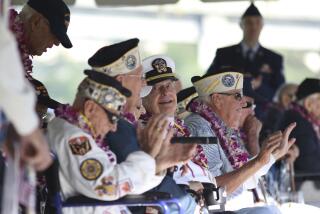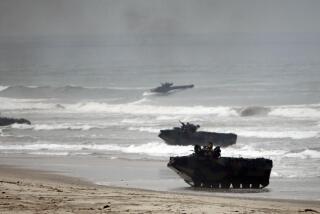Victor J. Croizat dies at 91; Marine combat commander in World War II
Retired Marine Col. Victor J. Croizat, a combat commander in some of the toughest battles of World War II and later a military advisor and diplomat to emerging nations in Africa, the Caribbean and Far East, has died. He was 91.
Croizat died of congestive heart failure May 8 at his home in Santa Monica.
After retiring in 1966, Croizat gained acclaim as a chronicler of the Marine Corps, particularly its development of an amphibious assault capability that proved decisive in the island-hopping campaign that followed the Japanese attack on Pearl Harbor.
As a second lieutenant, he commanded a company of Marines that landed at Guadalcanal on Aug. 7, 1942. In one two-hour stretch, Japanese battleships hit Marine positions with 918 rounds from 14-inch guns.
“It seemed like it lasted forever, day after day of getting bombed, shelled, shot at,” Croizat recalled in 1992. “You never got any real sleep, never got any real food.
“But nobody was going to drive us out…. We were there to stay. You’re damned if you’re going to let the Marine Corps down and damned if you’re going to let your outfit down.”
As a battalion commander, he led Marines in the assault on Kwajalein, Saipan, Tinian and Iwo Jima. He ended the war as a 26-year-old major.
In his 1997 autobiography, “Journey Among Warriors: The Memoirs of a Marine,” Croizat downplayed his own bravery and instead provided insight and anecdotes about some of the more colorful Marines from World War II: Merritt “Red Mike” Edson, Lewis “Chesty” Puller, Evans Carlson and Walter “Tabasco Mac” McIlhenny.
Marine historian Col. Joseph H. Alexander said the book “is most valuable as a perceptive window on the Corps during its most dramatic growth, downsizing [after World War II] and regeneration.”
Victor John Croizat was born Feb. 27, 1919, in Tripoli, Libya, the son of Italian-French parents. The family moved to the United States, and in 1940 Croizat graduated from Syracuse University, where he was part of the Reserve Officer Training Corps.
Commissioned in the Marine Corps, Croizat was assigned to the 1st Amphibian Tractor Battalion at New River, N.C., on Dec. 8, 1941, to develop better tactics and improved landing craft for bringing Marines and weapons ashore quickly while under fire.
By modern standards, the amphibious, armored, tracked vehicles were crude — but effective. “You always hoped the damned thing wouldn’t sink,” Croizat said at a 1996 reunion at Camp Pendleton.
During the Korean War, he was an instructor at the Marine Corps headquarters in Quantico, Va. Then came stints as an advisor to the French military in Indochina, an official observer during the Algerian War, and an observer/advisor/diplomat in Haiti, Thailand, Laos, Turkey, sub-Saharan Africa and, finally, an advisor to the military in South Vietnam. In 1964, he commanded the Camp Pendleton-based 5th Marine Regiment and helped devise a strategy for river operations in Vietnam.
After retiring from the Marine Corps, he earned a master’s degree at UCLA and worked as an operations analyst for the Rand Corp. and an international marketing representative for Grumman Aircraft.
Among his other books are “Across the Reef: The Amphibious Tracked Vehicle at War” (1989), considered one of the definitive texts on the evolution of amphibious warfare.
Survivors include his wife of 62 years, Meda, of Santa Monica; a daughter, Suzanne Croizat Borghei of Santa Monica; a son, John V. Croizat of El Cerrito, Calif.; and three grandchildren.
Services are pending.
More to Read
Start your day right
Sign up for Essential California for the L.A. Times biggest news, features and recommendations in your inbox six days a week.
You may occasionally receive promotional content from the Los Angeles Times.






